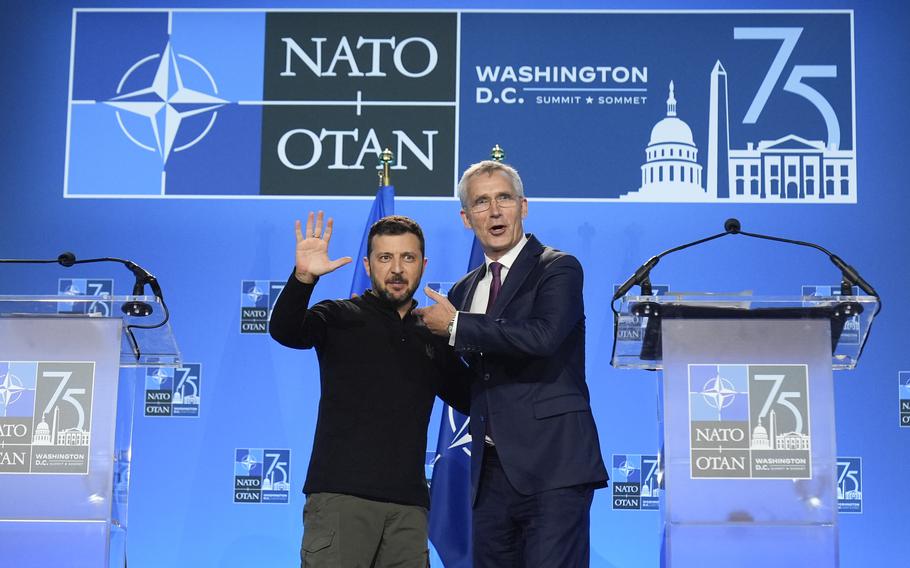Europe
Weapons and freedom to fire them into Russia more important than promises of NATO membership, Zelenskyy says
Stars and Stripes July 11, 2024

Ukraine’s President Volodymyr Zelenskyy and NATO Secretary General Jens Stoltenberg speak during a press conference at the NATO summit in Washington on Thursday, July 11, 2024. (Mark Schiefelbein/AP)
WASHINGTON — Ukrainian President Volodymyr Zelenskyy on Thursday welcomed NATO’s declaration this week that Ukraine is on an “irreversible” path to alliance membership but said it paled when compared to new pledges of weapons vital to Ukraine’s war effort.
“We’re not thinking in Ukraine about wording, [if we’re] close or not close to NATO,” he said on the last day of the alliance’s summit in Washington. “We are thinking about real strong steps from very strong people.”
Those steps include a commitment by NATO members to send dozens of air-defense systems in the coming months to counter relentless Russian bombardment, including at least four Patriot missile batteries.
The U.S. on Thursday announced a new $225 million military aid package for Ukraine that will include another Patriot system as well as artillery rounds and other ammunition.
Ukrainian President Volodymyr Zelenskyy presents an award to Senate Minority Leader Mitch McConnell, R-Ky., during a meeting Tuesday, July 9, 2024, on Capitol Hill. At left is Senate Majority Leader Chuck Schumer, D-N.Y., who also received the award. (Joe Gromelski/Special to Stars and Stripes)
Zelenskyy hailed the impending deliveries as the real success story of the summit, though he continued to press the U.S. to relax its restrictions on the use of American weapons in Russia.
“Today I see successes for our people, for our families,” he said. “Success is what gives us an opportunity to live.”
Still, he acknowledged the significance of strengthened language in a NATO document issued this week that showed movement toward Ukraine’s eventual membership in NATO.
“We are doing and will continue to do everything to ensure that the day comes when Ukraine is invited and becomes a NATO member,” he said. “And I’m confident we will achieve this.”
Andriy Borysovych Yermak, who leads Ukraine’s office of the president, said the inclusion of “irreversible” in the communique, which was the subject of much negotiation among NATO member states, was a strong step forward.
“It demonstrated that it’s not now the question of if, it’s a question of when,” Yermak said.
The next step will be for NATO to issue a formal invitation, he said.
But while Yermak put a positive spin on NATO’s decisions in Washington, the country’s future membership in the alliance is hardly a sure bet, regardless of the path now being characterized as irreversible.
“The bureaucratic, stilted language on a ‘bridge’ to NATO for Ukraine belies ongoing disagreement within the alliance on Ukrainian membership,” said Ann Marie Dailey, an expert on transatlantic security with the Atlantic Council, a Washington think tank.
In NATO, decisions on membership require the unanimous support of all 32 member states. Two important members of the alliance, the United States and Germany, also have repeatedly sent mixed signals about any quick entry into NATO.
President Joe Biden said in a June interview with Time magazine that he was “not prepared to support the NATO-ization of Ukraine.”
“It should not, it is not (a member),” Biden said. “I spent a month in Ukraine when I was a senator and vice president. There was significant corruption.”
Meanwhile, should former President Donald Trump return to the White House, a block on Ukraine membership could happen considering he has blamed NATO expansion as a factor in Russia’s decision to invade Ukraine. Critics of Trump’s position have blasted that notion, saying it parrots Kremlin talking points.
Other countries such as Hungary, which maintains ties to Russia, are also likely to resist bringing Ukraine into the alliance.
Proponents of Ukrainian membership argue the country will strengthen the alliance and make it militarily unfeasible for Moscow to attack the alliance’s eastern flank, given the strength of Ukraine’s position to the south.
Opponents counter that would increase the chances of direct conflict with Russia should the Kremlin ever attack Ukraine again.
At the summit, allies pledged a long-term assistance package of roughly $42 billion for the next year for military equipment and other support for Ukraine. That is on a par with what allies give annually now.
At an April ministerial meeting, NATO Secretary-General Jens Stoltenberg was seeking a five-year commitment from alliance members, with expenditures divided up based on each member’s gross domestic product.
When the idea came up again at a June defense chiefs meeting, Italian Defense Minister Guido Crosetto balked at the idea of a multiyear commitment, saying his country was already having difficulty spending 2% of GDP — a NATO requirement — on its own military.
“When we reach 2%, we will discuss further investments,” Crosetto said at the time.
Zelenskyy on Thursday bristled at suggestions that Ukraine’s membership in NATO would be a pinnacle of achievement for his country. He argued Ukraine would be an asset to the alliance.
“We strengthen NATO,” he said. “We are strong guys, we have a strong army and we are fighting against this tyrant and that’s why Ukraine in NATO [would be] a success [for us both].”